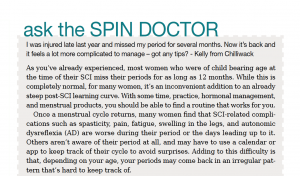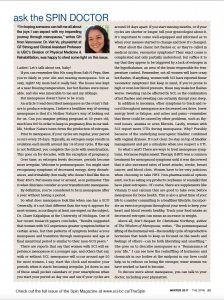WOMEN’S HEALTH
Overview
This chapter will cover information on a variety of health issues particular to women’s sexual and reproductive health. This includes: breast health (breast exams and mammography), bone health (bone density and osteoporosis), and reproductive health (cervical screening and menopause). Understanding how these may be different for you after SCI is an important part of keeping yourself healthy.
- What Is It?
- What’s Different Now?
- What Can I Do About It?
- Screening
- Cardiovascular disease risk
- Cervical screening (Pap test)
- Breast cancer screening (mammography)
- Bone density
- Menopause
- My Role & Who Can Help?
- Conclusion & Resources
What Is It?
Women’s health is important throughout your life. It becomes increasingly important though, as women age, to undergo regular screening to maintain optimal health. It may be difficult to access these screening tests for women with disabilities, and these more common concerns of daily life when dealing with SCI complications can be easily overlooked. This chapter describes the common healthcare concerns that are screened for in women, and offers advice and information to help you discuss these tests with your physician and ensure you are receiving the care you need.
What’s Different Now?
Spinal cord injury can put you at a greater risk for many health issues as you age, and may affect your ability to detect and get care for your life-long sexual and reproductive healthcare needs, such as cancer screenings and cardiovascular risk. SCI also affects things that are also of greater concern as you age such as bone density. It’s important to know what to look for and what screening is needed so you can work with your healthcare team to ensure you can be as healthy as possible throughout your life.
Menstruation
If you are in your reproductive years and have a spinal cord injury, managing your menstrual cycle may look or feel different than before your injury, and may interact with SCI complications like spasticity, pain and autonomic dysreflexia (if you are already at risk for it).
Some women with SCI find their period is a time where they experience disruptions in their SCI related complications such as more pain and spasticity, so you may need to talk to your doctor about proactively managing your pain during that time. Many find the same approaches to dealing with menstrual cramps work post-injury, such as heating pads, a warm bath, anti-inflammatories and exercise or movement. Take caution when using heat sources on your skin if you do not have sensation – check your skin frequently and never fall asleep on a heated pad. Many non-disabled women complain about “period poops” too, so you may also find that your bowel routine is altered by your period, and you might need a different approach during that time.
Depending on your level of SCI or other disability, you may find that your ability to transfer, and your hand function may play a role in how you choose to manage your menstrual cycle – for example, using tampons vs. pads, or choosing to avoid periods altogether.
Managing Menstruation: Ask the Spin Doctor – The Spin Magazine, Winter 2020
What Can I Do About It?
Understand the screening tests recommended for women to catch health issues early, and the unique issues that women with SCI may have in accessing those tests, or detecting signs of women’s health issues.
Guidelines for Screenings: When and Why
Cardiovascular disease & metabolic syndrome
Persons with SCI are at a greater risk for cardiovascular disease and metabolic syndrome. Your risk increases with age, level of injury and severity of injury.
Metabolic syndrome: A cluster of conditions that occur together increasing your risk for cardiovascular disease, type 2 diabetes and stroke. Metabolic syndrome is defined as having 3 or more of the following traits:
- a waistline that measures more than 35 inches (89 centimeters) for women
- high triglyceride level (a type of fat in your blood),
- low “good“ cholesterol, called HDL cholesterol,
- increased blood pressure, and
- increased blood sugar.
These can be measured by your doctor. Testing should start earlier for people with spinal cord injury even without obvious signs. Speak with your doctor about when testing should start for you.
RESOURCE
Early Identification of Cardiovascular Diseases in People with SCI
Cervical cancer screening
Cervical screening is done to detect the early signs of cervical cancer. The BC Cancer Agency recommendations state that women between the age of 25-69 who are sexually active (even they if have received the HPV vaccine) be screened every 3 years.
RESOURCE
Cervical Screening in BC
Breast Exam:
The Canadian Cancer Society no longer endorses breast exams for women who are of low risk of breast cancer (ages 40-74); however, they do recommend that ALL women are familiar with their breasts by paying attention to how they look and feel. Any changes can be discussed with your doctor. To familiarize yourself with your breasts, a self-breast exam can still be used as a guide.
Note: should your hand function limit your ability to do this exam for yourself, it could be done by your partner and/or family doctor.
Mammogram
A mammogram (or mammography) is another test to detect changes in breast tissue to assist in detecting breast cancer earlier. This test can also provide information about your breast tissue density. The BC Cancer Agency recommends mammography screening to begin at age 40. This is to be done every two years unless you have a first degree relative (parent or sibling) who has had breast cancer. Mammography would be done yearly in this case and you would be considered to have higher than average risk.
Bone density:
Spinal cord injury puts you at higher risk for osteoporosis. Please talk to your doctor about when testing bone density might be right for you.
Menopause:
This is an area that needs more research specific to women with SCI. Some research shows that the onset of menopause is similar for women with SCI and the general population. The largest published comparison study of women with SCI in menopause to the general population indicated that there may be some differences in the way that women with SCI report certain symptoms.
While It’s not clear if menopause is different for most women with SCI, what we do know is that women with SCI do experience menopause symptoms, and they can sometimes interact with SCI complications. Read on for the word from Dr. Viet Vu on what to expect from menopause while living with spinal cord injury (From The Spin magazine, Winter 2017, pg. 23.) Click the image below for a larger print, PDF version.
How to Prepare for These Appointments/What To Know
Mammograms in particular can pose a challenge for women with paralysis as testing clinics often assume you are able to stand independently for a period of time. Not every mammography clinic is prepared for someone who cannot stand, so make sure to ask when you make an appointment and let them know what your mobility is. Here is some important information on Mammogram Accessibility and 10 mammogram questions for wheelchair users to ask of their doctors/clinics to ensure access for their specific needs.
RESOURCE
Bone Density After a SCI
My Role
Your role is to be informed. Speak with your health care providers, be aware of your body and any changes in it that concern you and learn where to find help to address it. If you can’t physically get help for breast self-exams, mammograms or cervical cancer screening, learn where the resources are in your community and keep on top of regular care for your sexual and reproductive health.
Who Can Help Me?
Your Physiatrist (rehab medicine specialist) is the person to talk to about women’s health concerns where they overlap with your spinal cord injury concerns, such as bone density concerns, discussing childbearing and your SCI, or managing your bladder during sex or pregnancy, etc. If you don’t have a Physiatrist in your community you can ask for a referral to GF Strong’s Outpatient SCI Clinic if you live in BC or the Yukon.
Your Family Physician (also called a GP) is your go-to person to monitor any women’s health concerns you may have related to contraception, reproduction, breast or cervical cancer screenings, bone density, etc. You do not need a referral to see a family physician, but family physicians can also refer you to specialist clinics or physicians to address issues beyond every day management and wellbeing.
Seek help for everyday women’s healthcare you can’t get from your family physician from The Access Clinic at BC Women’s Hospital. This clinic offers women’s health services from contraception consultation and implantation to cancer screenings. You can self-refer or have your family physician refer you.
Conclusion
Accessing these routine screening assessments are essential for optimal health for any woman. We understand that accessibility can oftentimes make these tests feel like a huge hassle for women with spinal cord injury, but we hope the information provided here can help you prepare and feel proactive in your health.
Women's Health Resources
Tools
Tina - Adaptive applicator for tampons, designed for people with decreased hand function.
Online
10 Mammogram Questions for Wheelchair Users - Word of Mouth Mammogram e-Network
Bone Density After SCI - Spinal Cord.com
Breast Self-Examination - Healthlink BC
Cervical Cancer Screening: FAQs - BC Cancer Agency
Cervix - BC Cancer Agency
Early Identification of Cardiovascular Diseases in People With Spinal Cord Injury - Archives of Physical Medicine and Rehab (PDF)
Guidance: Breast Density - BC Cancer
It's Not Easy, But You Must Get Your Mammogram - Sheri Denkensohn-Trott, New Mobility magazine
Wheeling Through Menopause - Paula M. Larson, New Mobility magazine
Osteoporosis, Menopause, and Disability - June Price, New Mobility magazine
Menopause Characteristics and Subjective Symptoms in Women With and Without Spinal Cord Injury. Kalpakjian, Quint, Bushnik et al. Archives of Physical Medicine and Rehabilitation. 2010. (Free full text)
Questions to Ask Your Doctor Prior to an Appointment - Shepherd Centre (PDF)
SCI Forum Report: Women and SCI - University of Washington
Who Should Get A Mammogram? - BC Cancer
Women with Disabilities Have Sex. Why Are Their Sexual Health Needs Often Ignored? - White Coat, Black Art, CBC
Videos
Reproductive Health for Women with SCI video series - UAB School of Medicine
Check out the Video Playlist for this chapter!
VIDEO
Check out the video playlist for this chapter!



